
By Marilyn Adamson
We all want to make it through life with success, some sense that we did it right. So what about the major world religions? Is there anything in them that might give our lives greater depth and direction?
The following looks at the major world religions… Hinduism, New Age Spirituality, Buddhism, Islam, and Christianity.* There is a brief description of each, their view of God, and what a person can gain from that religion.
*Each of these religions has sects with differing beliefs. The description given here focuses on the core beliefs of each religion. Other major religions, such as Judaism, could be discussed, but for brevity, we have chosen these.
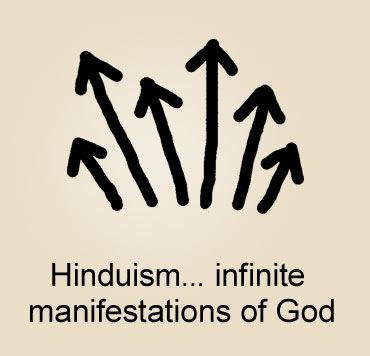 Most Hindus worship one Being of ultimate oneness (Brahman) through infinite representations of gods and goddesses. These various deities become incarnate within idols, temples, gurus, rivers, animals, etc.
Most Hindus worship one Being of ultimate oneness (Brahman) through infinite representations of gods and goddesses. These various deities become incarnate within idols, temples, gurus, rivers, animals, etc.
Hindus believe their position in this present life was determined by their actions in a previous life. Hinduism therefore provides a possible explanation for suffering and evil in this life. If a person’s behavior before was evil, they might justifiably experience tremendous hardships in this life. Pain, disease, poverty or a natural disaster is deserved by that person because of their own evil actions, usually from a previous lifetime.
A Hindu's goal is to become free from the law of karma…to be free from continuous reincarnations. Only the soul matters which will one day be free of the cycle of rebirths and be at rest.
Hinduism lets a person choose how to work toward spiritual perfection. There are three possible ways to end this cycle of karma: 1. Be lovingly devoted to any of the Hindu deities; 2. Grow in knowledge through meditation of Brahman (oneness)…to realize that circumstances in life are not real, that selfhood is an illusion and only Brahman is real; 3. Be dedicated to various religious ceremonies and rites.
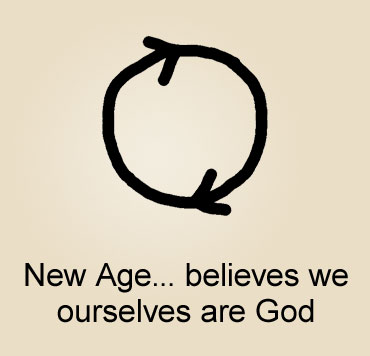 New Age Spirituality promotes the development of the person's own power or divinity. When referring to deity, a follower of this type of spirituality is not talking about a transcendent, personal God who created the universe, but is referring to a higher consciousness within themselves. A person pursuing spiritual development would see themselves as deity, the cosmos, the universe. In fact, everything that the person sees, hears, feels or imagines is to be considered divine.
New Age Spirituality promotes the development of the person's own power or divinity. When referring to deity, a follower of this type of spirituality is not talking about a transcendent, personal God who created the universe, but is referring to a higher consciousness within themselves. A person pursuing spiritual development would see themselves as deity, the cosmos, the universe. In fact, everything that the person sees, hears, feels or imagines is to be considered divine.
Highly eclectic, New Age Spirituality is a collection of ancient spiritual traditions, taught by a vast array of speakers, books and seminars. It acknowledges many gods and goddesses, as in Hinduism. The Earth is viewed as the source of all spirituality, and has its own intelligence, emotions and deity. But superseding all is self. Self is the originator, controller and power over all. There is no reality outside of what the person determines.
New Age teaches eastern mysticism and spiritual, metaphysical and psychic techniques, such as breathing exercises, chanting, drumming, meditating…to develop an altered consciousness and one's own divinity.
Anything negative a person experiences (failures, sadness, anger, selfishness, hurt) is considered an illusion. Believing themselves to be completely sovereign over their life, nothing about their life is wrong, negative or painful. Eventually, a person develops spiritually to the degree that there is no objective, external reality. A person, becoming a god, creates their own reality.
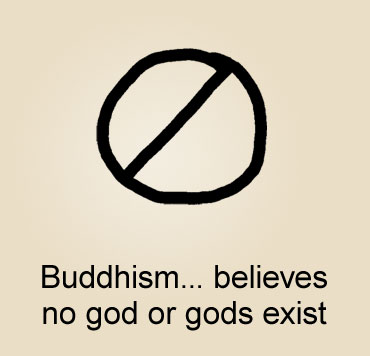 Buddhists do not worship any gods or God. People outside of Buddhism often think that Buddhists worship the Buddha. However, the Buddha (Siddhartha Gautama) never claimed to be divine, but rather he is viewed by Buddhists as having attained what they are also striving to attain, which is spiritual enlightenment and, with it, freedom from the continuous cycle of life and death.
Buddhists do not worship any gods or God. People outside of Buddhism often think that Buddhists worship the Buddha. However, the Buddha (Siddhartha Gautama) never claimed to be divine, but rather he is viewed by Buddhists as having attained what they are also striving to attain, which is spiritual enlightenment and, with it, freedom from the continuous cycle of life and death.
Most Buddhists believe a person has countless rebirths, which inevitably include suffering. A Buddhist seeks to end these rebirths. Buddhists believe it is a person's cravings, aversion and delusion that cause these rebirths. Therefore, the goal of a Buddhist is to purify one's heart and to let go of all yearnings toward sensual desires and the attachment to oneself.
Buddhists follow a list of religious principles and adhere to personal restraint, fasting and very dedicated meditation. When a Buddhist meditates it’s not the same as praying or focusing on a god, it is more of a self-discipline. Through practiced meditation, a person may reach Nirvana – "the blowing out" of the flame of desire.
Buddhism provides something that is true of most major religions: disciplines, values and directives that a person may want to live by.
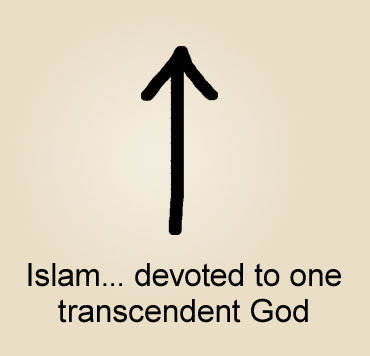 Muslims believe there is the one almighty God, named Allah, who is infinitely superior to and transcendent from humankind. Allah is viewed as the creator of the universe and the source of all good and all evil. Everything that happens is Allah's will. He is a powerful and strict judge, who will be merciful toward followers depending on the sufficiency of their life's good works and religious devotion. A follower's relationship with Allah is as a servant to Allah.
Muslims believe there is the one almighty God, named Allah, who is infinitely superior to and transcendent from humankind. Allah is viewed as the creator of the universe and the source of all good and all evil. Everything that happens is Allah's will. He is a powerful and strict judge, who will be merciful toward followers depending on the sufficiency of their life's good works and religious devotion. A follower's relationship with Allah is as a servant to Allah.
Though a Muslim honors several prophets, Muhammad is considered the last prophet, and his words and lifestyle are that person's authority. To be a Muslim, one must follow five religious duties: 1. Repeat a creed about Allah and Muhammad; 2. Recite certain prayers in Arabic five times a day; 3. Give to the needy; 4. One month each year, fast from food, drink, sex and smoking from sunrise to sunset; 5. Pilgrimage once in one's lifetime to worship at a shrine in Mecca. At death – based on one's faithfulness to these duties – a Muslim hopes to enter Paradise. If not, they will be eternally punished in hell.
For many people, Islam matches their expectations about religion and deity. Islam teaches that there is one supreme deity, who is worshiped through good deeds and disciplined religious rituals. After death, a person is rewarded or punished according to their religious devotion. Muslims believe that giving up one’s life for Allah is a sure way of entering Paradise.
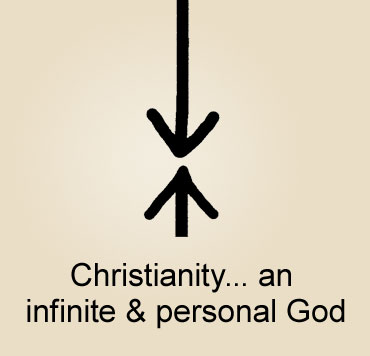 Christians believe in one eternal God who is creator of all that is. He is viewed as a loving God who offers everyone a personal relationship with himself now in this life.
Christians believe in one eternal God who is creator of all that is. He is viewed as a loving God who offers everyone a personal relationship with himself now in this life.
In his time on Earth, Jesus Christ did not identify himself as a prophet pointing to God or as a teacher of enlightenment. Rather, Jesus claimed to be God in human form. He performed miracles, forgave people of their sin and said that anyone who believed in him would have eternal life.
Followers of Jesus regard the Bible as God's written message to humanity. In addition to being a historical record of Jesus' life and miracles, the Bible reveals his personality, his love and truth, and how one can know and relate to God, as you could a friend.
Christians believe that all people sin, including themselves. They see Jesus as sinless and their Savior, the Messiah who was prophesied by all the prophets of the Old Testament, in the Bible. They believe that Jesus Christ, out of love for us, paid for the sin of all of humanity by dying on a cross. Three days later, he rose from the dead as he promised, proving his deity.
It would be nice to think that all religions are worshiping the same God. But it would require New Age to stop believing they can become a god, for Islam to give up their one God, Hinduism to give up their numerous gods, and Buddhism to establish that there is a God.
The world's major religions (Hinduism, New Age Spirituality, Buddhism, Islam, Christianity) are also quite unique in their requirements.
In Hinduism, a person is on their own trying to gain release from karma. In New Age, a person is working at their own divinity. In Buddhism, it is an individual quest at being free from desire. And in Islam, the individual follows religious laws in hope of paradise after death. And in Christianity, many are trying to live by the 10 Commandments.
We’re all aware of personal failings and the need to be better. This is what leads to the creation of religions.
 We also want to feel at peace, fulfilled and have inner strength. And so we move to practices like meditation, religious rituals, self-help books, fasting, prayer, personal sacrifice, pilgrimages, etc.
We also want to feel at peace, fulfilled and have inner strength. And so we move to practices like meditation, religious rituals, self-help books, fasting, prayer, personal sacrifice, pilgrimages, etc.
Maybe these will increase our inner goodness and make amends for our sins.
It’s like we draw conclusions about a higher power, construct religions, and do our best to connect to this creator/power, to be accepted. It all seems logical. But is it true?
Reality is often not what we expect. Remember when you first learned how babies are made? Weren’t you completely surprised by that approach?
Or isn’t it surprising that the laws of physics, like the speed of light, stay consistent throughout the universe and are mathematically measurable? We would have thought it all to be more random.
What’s real, true, is often surprising. Not at all what we would expect.
Wouldn’t it be great if God would simply reveal himself? Actually show up and tell us, “This is who I am.”
Unexpectedly, God did exactly that. He who created us, left heaven and became one of us in the person Jesus Christ.
And, equally surprisingly, he invites us to know him and enjoy a close, personal relationship with him. Jesus Christ welcomes us:
 “If anyone thirsts, let him come to me to drink…out of his heart will flow rivers of living water.”1
“If anyone thirsts, let him come to me to drink…out of his heart will flow rivers of living water.”1
“I am the light of the world, he who follows me will not walk in darkness, but will have the light of life.”2
“I came that you might have life and have it more abundantly.”3
“Come to me all who are weary and heavy laden, and I will give you rest.” He goes on to explain, like a yoke placed together on a strong ox and weak ox, he invites us to let him carry our load. “Take my yoke upon you, and learn from me, for I am gentle and lowly in heart, and you will find rest for your souls. For my yoke is easy, and my burden is light.”4
This is God, the Creator of the universe, inviting us to freely come to him, to know him, to rely on him. He’s not pointing to a method of self-improvement like the Eight Fold Path or the Five Pillars or obeying the Ten Commandments.
He invites us to experience a direct, personal relationship with him, not requiring a religious system in the middle, between us and God.
Religion would never invent such a gracious God.
 Our decision is not which religion to pursue, but how will we respond to God who invites us to know his love, to be guided by him, and be cared for by him?
Our decision is not which religion to pursue, but how will we respond to God who invites us to know his love, to be guided by him, and be cared for by him?
Jesus Christ doesn’t ask us to believe in him without proof, without reason. To see why you can trust him and begin to know his love for you in a personal way, please see Beyond Blind Faith.
| ► | How to know God... |
| ► | I have a question or comment... |
Footnotes: (1) Matthew 11:28-30 (2) John 7:37-38 (3) John 8:12 (4) John 10:10 (5) Revelation 3:20
Other articles/videos you might be interested in…